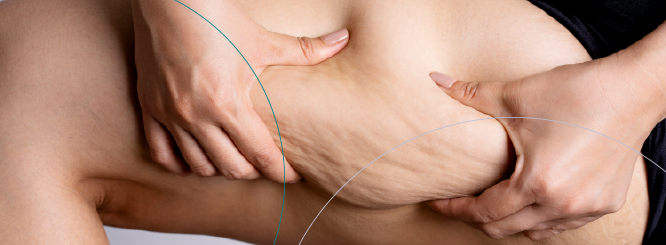
Weight loss can look different for everyone, but their goal is similar: to be healthy and feel comfortable and happy in their own skin. There are many ways to achieve said weight loss, from lifestyle changes–which includes a new diet and exercise–to clinical procedures, such as weight loss or bariatric surgery. Of course, this can only be decided by a certified doctor that will determine if you’re a candidate for bariatric surgery and which procedure is best for you. Your needs and expectations, along with your medical history, also come into play.
There are many benefits to weight loss surgery and it has been proven that these procedures expand the patient’s life expectancy[1], as well as shown to lower a person’s risk of death from any cause by over 40%. Other studies have highlighted that modern bariatric procedures have “strong evidence of efficacy and safety” and that it can benefit patients with type 2 diabetes[2]. However, we can’t ignore that there are still things to address following weight loss surgery.
If a patient goes through extreme weight loss, it’s likely that they will have to deal with loose skin. Surgery can be a scary thing, the idea of being put under anesthesia and being cut open may deter some patients from even considering it as an option, and having to deal with loose skin following the procedure may also make patients nervous.
LIMARP® is an internationally recognized bariatric surgery center with a well-rounded medical and surgical team that’s led by Dr. Liza María Pompa González, whose experience, along with the state of the art technology available at the clinic, ensures that every patient who comes through our door gets the best attention possible. We offer integral treatment plans that are created based on the patient’s profile, as well as available options for dealing with loose skin.
This article will focus on loose skin following a weight loss surgery or any type of extreme weight loss, why it takes so long to tighten up, and how to treat it.
The information we’re about to present is general, so keep in mind that each patient’s case is different. For more specialized attention, schedule an appointment with your doctor so that they can provide the exact information that pertains to your situation.
Weight Gain and Skin Changes
As you probably know, skin is the largest organ in the human body and each of its layers play a role in protecting you against the environment that surrounds you. It is also made of proteins that allows it to remain firm and strong, especially after being stretched due to pregnancy or weight gain. These proteins are collagen and elastin; the former makes up 80% of the skin’s structure, while the latter provides the elasticity the skin needs to remain tight. When a person starts to gain weight, the skin expands to make room for the extra fat and, if it occurs during a prolonged period of time, the collagen and elastin fibers become damaged[3].
This is one of the reasons skin becomes saggy and if a person undergoes extreme weight loss, the excess skin may hang from the body. This loose skin will not retract due to several factors, for example:
- Skin is the biggest organ in the human body and it can adapt itself to a lot of situations, but it has one drawback, it’s a slow process.
- The loose skin may lack the necessary proteins to return to its original shape.
- Research[4] has found that people who have weight loss surgery form less new collagen, and its composition is not as strong.
- Other factors, such as age, smoking, and family history may also influence how the loose skin recovers following extreme weight loss.
The production of collagen is highly affected by this last bullet point: older skin does not produce the same amount of collagen as younger skin and smoking[5] damages and reduces the amount that already exists in the skin. While weight loss surgery helps lower the risk of comorbidities related to obesity, such as type 2 diabetes, high blood pressure, sleep apnea, and cardiovascular diseases, there are still subsequent problems that can arise following extreme weight loss. Some of them may be postoperative complications that need to be addressed with additional surgery, but others pertain to the loose skin that remains once a patient sheds the extra weight.
Loose Skin: Problems and Side Effects
After major weight loss, whether from exercise or surgery, loose skin is to be expected. Some patients, according to the amount of skin that remains loose following a drop in their weight, can continue on without much of a second thought. They either accept and adapt to their bodies or don’t really mind because the amount of loose skin is not hindering their day-to-day activities. However, many problems can arise from having too much loose skin hanging from the body and it can bring physical, as well as emotional, challenges for the patient.
One of the main problems is physical discomfort because the loose skin can intervene with how a person carries out their daily activities[6], especially when it comes to exercise. Getting back on track after undergoing major surgery is not an easy feat and when it comes to weight loss surgery, physical activity is one of the main aspects a patient must focus on to keep a healthy weight. However, loose skin can be both a physical and emotional setback because it can make the patient feel self-conscious about their body image. One study[7] pointed out that “women who had loose skin after bariatric surgery cited their skin as a barrier to physical activity”.
It’s no question that there is a lot of work that needs to be done in order to repair years of low self-esteem and body dysmorphia, especially if it begins to affect a patient’s progress following their weight loss. Other studies[8] have shown that loose skin, along with body discomfort, can have a negative impact on a person’s mood and productivity.
While the previous information basically covers up the emotional discomfort a person can experience, having loose skin can also result in physical discomfort in the shape of chafing and skin irritation. How does this happen? Well, loose skin tends to fold over itself, thus rubbing together and chafing; chafing, in turn, can cause painful rashes that, if not treated correctly, can lead to infections. These infections can enter the body if the skin tears. Another way of contracting an infection is by not thoroughly cleaning each fold of the loose skin, causing the accumulated bacteria to overgrow[9].
The risk of infection can be lowered if the patient takes proper care of their loose skin, especially if it’s a side effect of major bariatric surgery. These infections can have serious consequences if they’re not treated correctly and in time, so if you’re experiencing any pain or discomfort due to loose skin on your body, make sure to contact your doctor right away to find the solution that is best for you.
How to Treat Loose Skin
There are many ways to treat loose skin and tighten it up. In this section of the article, we’ll go over natural remedies, as well as surgical ones to ensure that you have all the necessary information in case you want to try any of them. One of the most popular treatments, albeit one of the slowest ones, is exercising, especially resistance training. Lifting weights can help you build body mass and reduce the amount of loose skin[10]. Other natural remedies include taking collagen, consuming nutrients (vitamin C, omega-3 acid, protein), using firming creams, as well as compression clothing.
Post-bariatric plastic surgery can tighten excess skin and reshape your body following dramatic weight loss. A number of body contouring procedures can create a more toned and attractive appearance. Dr. Liza María Pompa González and her surgical team have performed thousands of weight loss surgeries at LIMARP® and her plastic surgery specialists have helped many patients from all over the world achieve their physical and cosmetic goals.
Body contouring procedures can address multiple areas, such as the upper arms, breasts, abdomen, thighs, and buttocks to dramatically improve your weight loss results. These treatments can address excess skin and folds on the neck, arms, breasts, back, abdomen, hips, thighs, and buttocks.
The best candidates include patients in good overall health who are at a healthy, stable weight and are committed to following a healthy lifestyle.
Contact Us to Learn More
If you want to know more on how to treat loose skin following extreme weight loss, schedule an appointment with one of our doctors. We can help determine the right treatment for you. Contact us online anytime or give us a call at (619) 373-0229.
References
- [1] Arterburn DE, Olsen MK, Smith VA, et al. Association between bariatric surgery and long-term survival. JAMA. 2015;313(1):62–70. doi:10.1001/jama.2014.16968
- [2] Arterburn DE, Telem DA, Kushner RF, Courcoulas AP. Benefits and Risks of Bariatric Surgery in Adults: A Review. JAMA. 2020;324(9):879–887. doi:10.1001/jama.2020.12567
- [3] Sami K, Elshahat A, Moussa M, Abbas A, Mahmoud A. Image analyzer study of the skin in patients with morbid obesity and massive weight loss. Eplasty. 2015;15:e4.
- [4] Gallo JRB, Maschio-Signorini LB, Cabral CRB, de Campos Zuccari DAP, Nogueira ML, Bozola AR, Cury PM, Vidotto A. Skin Protein Profile after Major Weight Loss and Its Role in Body Contouring Surgery. Plast Reconstr Surg Glob Open. 2019 Aug 19;7(8):e2339. doi: 10.1097/GOX.0000000000002339. PMID: 31592376; PMCID: PMC6756662.
- [5] Beylot C. Vieillissement cutané – Vieillissement facial global : orientation thérapeutique [Skin ageing-General features of facial ageing and therapeutic choices]. Ann Dermatol Venereol. 2019 Jan;146(1):41-74. French. doi: 10.1016/j.annder.2018.10.015. Epub 2018 Dec 20. PMID: 30581032.
- [6] Giordano S, Victorzon M, Koskivuo I, Suominen E. Physical discomfort due to redundant skin in post-bariatric surgery patients. J Plast Reconstr Aesthet Surg. 2013 Jul;66(7):950-5. doi: 10.1016/j.bjps.2013.03.016
- [7] Baillot A, Asselin M, Comeau E, Méziat-Burdin A, Langlois MF. Impact of excess skin from massive weight loss on the practice of physical activity in women. Obes Surg. 2013 Nov;23(11):1826-34. doi: 10.1007/s11695-013-0932-0.
- [8] de Zwaan M, Georgiadou E, Stroh CE, Teufel M, Köhler H, Tengler M, Müller A. Body image and quality of life in patients with and without body contouring surgery following bariatric surgery: a comparison of pre- and post-surgery groups. Front Psychol. 2014 Nov 18;5:1310. doi: 10.3389/fpsyg.2014.01310. PMID: 25477839; PMCID: PMC4235262.
- [9] Wagenblast AL, Laessoe L, Printzlau A. Self-reported problems and wishes for plastic surgery after bariatric surgery. J Plast Surg Hand Surg. 2014 Apr;48(2):115-21. doi: 10.3109/2000656X.2013.822384. Epub 2013 Jul 23. PMID: 23879775.
- [10] Stock MS, Olinghouse KD, Drusch AS, Mota JA, Hernandez JM, Akalonu CC, Thompson BJ. Evidence of muscular adaptations within four weeks of barbell training in women. Hum Mov Sci. 2016 Feb;45:7-22. doi: 10.1016/j.humov.2015.11.004. Epub 2015 Nov 14. PMID: 26583966.


